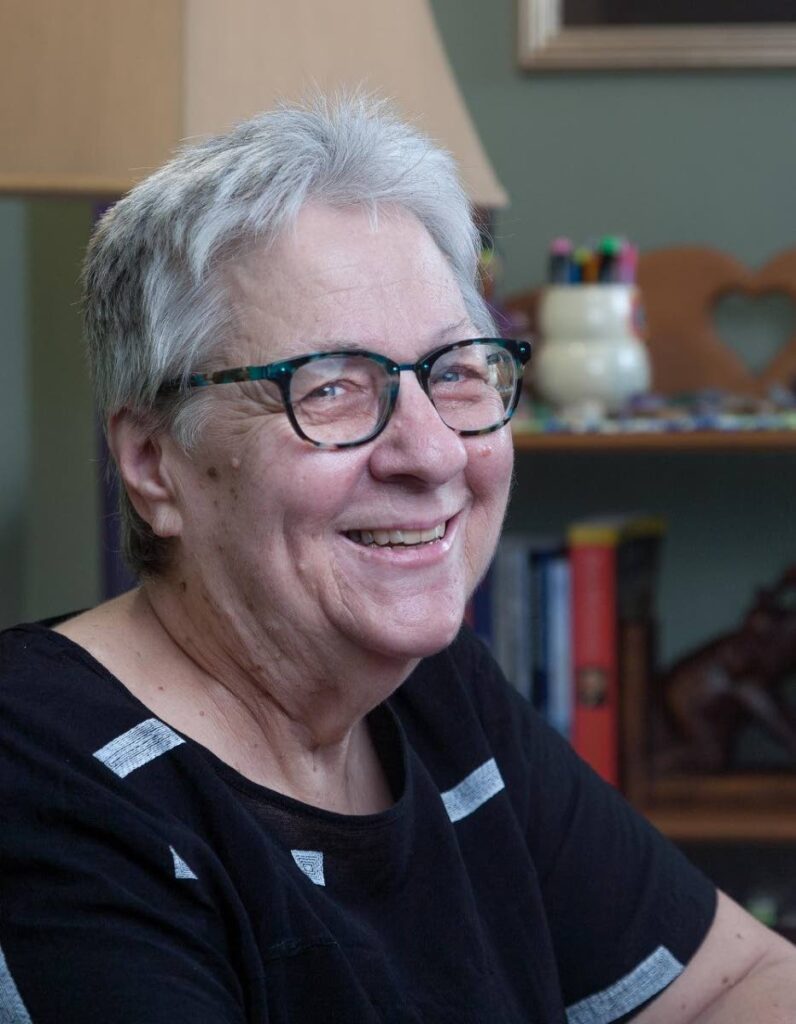Singing Carnival’s praises

DEBBIE JACOB
WELCOME TO Carnival 2023, our joyful road to recovery after the 2020 covid19 pandemic that managed to cancel and then scale down our beloved celebration.
Carnival 2023 makes a bold statement. We are back, and “No, no, we ent goin’ home,” as Christopher “Tambu” Herbert, co-lead singer of Charlie’s Roots, sang in one of his road marches.
Today, as blue devils, minstrels, dame Lorraines, bats and other J’Ouvert characters usher in the Carnival, I remember some cherished moments from my early days of journalism when I wrote calypso features.
I recall Keith Smith tapping out calypso stories with two fingers on those old, clunky computers in the Express office, pausing often to shout in his rumbling, gravelly voice, “Where is Blue Boy (SuperBlue)?”
Keith felt Carnival could not officially begin until SuperBlue flew in from New York.
At night, I always ended up at Shadow’s Masters Den filled with quirky characters like Cardinal and unexpected performers like journalist Daisann McLane, who sang as Lady Complainer. In the Masters Den you found Cro Cro, Rio, Mba and a slew of calypsonians who never expected to catch the calypso judges’ nod for a place in the Calypso Monarch competition. Still, they sang their hearts out.
I remember my first calypso assignment, covering Lord Kitchener’s tent on opening night in Arima. When Black Stalin sang Wait Dorothy in 1985, I recognised it as a profound protest song as important as any other in the world.
Calypso taught me invaluable lessons about journalism. When Keith Smith, Luis Hart and I produced a special programme on Roaring Lion for Prime Radio, I told Julian Rogers, the manager, “We’ll pay Pretender $300 for his interview.”
Before Julian could object, I said, “I know journalists don’t pay people for interviews, but these old calypsonians struggle. They need some money.”
Julian graciously complied. On the radio, Pretender gushed about Lion’s talent and songs.
After the programme, Pretender asked, “Do you have the money?”
I handed him an envelope. He ripped the edge, counted $300, looked me in the eye and shouted, “Worse man I ever met.” He spewed venom about Lion for about ten minutes while I thought, “You looked for this. Stick to the rules when it comes to interviews.”
Then there was a night at Deluxe Cinema when an angry mob wanted to beat me for writing how SuperBlue had dropped the microphone and ran offstage on the night the judges visited.
“Who told you to write that story?” someone shouted from the circle closing in on me.
SuperBlue appeared – as if by magic – grabbed my hand, pulled me away from his fans and said, “I gave her that permission. I told her to always write the truth because no one will believe the good things if you skip the bad things.”
On Carnival Monday 1992, I walked the streets of Port of Spain with SuperBlue until my feet hurt. My dad, who loved all music, had died a few days before, and this seemed to be the most fitting tribute I could offer him. I felt my dad’s presence.
I still long for the days when I looked up from the story I typed to see The Mighty Popo entering the newspaper office with a Carnival scheme. Once, he came to tell me we were going to the Ministry of Culture to claim he had invented pan.
“There’s a lot of money in pan,” Popo said.
“But Popo, how can we possibly do this?”
“Easy, my dear lady,” he said. “We will go to the minister’s office and knock on the door.”
If I close my eyes I see Singing Sandra holding my baby daughter Ijanaya and singing to her as Sandra waited to go onstage in Kitchener’s Revue. I see Kitchener singing 12-Bar Joan, a fitting, jazzed-up calypso to remind me how I straddled two cultures, my birthplace in the US and here.
My fondest memory is walking up George Street with Justice Kathy Ann Waterman Latchoo when she and I were colleagues at the Express to visit the first official calypso monarch, Growling Tiger. Tiger spoke of how motifs from melodies – like a few notes in David Rudder's and Pelham Goddard’s The Hammer – reappeared in songs by young calypsonians who could not possibly have ever heard them. It was a magical explanation of the Guyanese magical realist writer Wilson Harris’s theory of fossil memories.
Music and magic...that is the secret of Carnival. Harris and Tiger believed we pass down cultural memories like we pass on genes.
Happy Carnival, dear readers. Make magic.


Comments
"Singing Carnival’s praises"